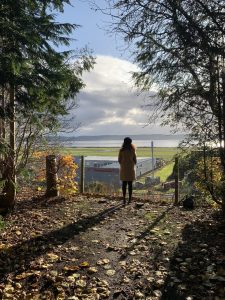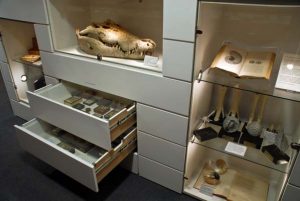Essay Fragments by Elisabeth Husum
I stare at the stolid girl in the mirror. Her long, dark, hair hangs awkwardly over a warm face with blue eyes. Exactly like her mother’s. As the years go by, she looks more like her mother and less like the little girl who walked around hand-in-hand with her daddy, dancing with her siblings while screaming the lyrics to Purple Rain in the kitchen, or baking chocolate chip cookies to enjoy in front of the fireplace on a rainy afternoon.
Now, the way I perceive this body seems to be embedded with the word of Love.
The girl in the mirror tells me she does not believe in “Love”. It is a myth she spent her childhood years waiting for, yearning to find the one Love that would finally stay and not leave her broken and hurt. Now she spits the word whenever she mentions it. She finds her identity in the emotions that drive her around. . . the not-quite-human forces of objects and things.
But I tell her; I love Love. Love stays steadfast in my name through the mouthfeel of its four letters. The hissing sound it makes as it passes through gritted teeth. The soft hugs in open-mouthed sentences. Love seems to stay in the middle of the mouth. It stays within as I whisper to an empty room, but it leaves me exposed, waiting. Ends on my lower lip of a slightly open mouth. I can’t escape it, its taunting. I curse it, hate it and yet worship it. Love is in the parts of this mirrored body as I watch her and she watches me, part for part. We can never not think about Love, she and I, though it always seems to always differ in the way it appears from me to her.
Simone de Beauvoir claims, “one is not born, but rather becomes a woman”. . . In this sense gender is in no way a stable identity or locus of agency from which various acts proceed; rather it is an identity tenuously constituted in time – an identity instituted through a stylised repetition of acts… Instituted through the stylization of the body and hence, must be understood as the mundane way in which bodily gestures, movements and enactments of various kinds constitute the illusion of an abiding gendered self. . .
Judith Butler
*
If my name is me but it isn’t mine what is it that I am?
Am I all but the things I do
the things I make.
I’m making sourdough
kneading it with soft fingers
the way you used to touch my body
I’m making poetry
I’m making the same as yesterday
I’m making nothing
I’m trying to make as much as possible because my biggest fear is to one day wake up
when I’m 63
and I realise I haven’t
made anything at all
and then what am I?
I am the love in the name my mother gave me–
Elisabeth, put your seatbelt on
I am the words I tell myself.
Find a man who will love you
so you don’t have to love yourself
I am the future I’m kneading in pink play dough.
My name is like an unfitted glove I wear once in a while when I’m with the people who named me, or strangers who don’t know the person identified by this piece of plastic. It tells me I am
- the language I speak
- the glasses I never wear–
- the hair that’s never straight–
- the smile I couldn’t bear
- the birth date that’s indicating a number which somehow tells strangers something about me (I’m not sure what it is)
- the date of a memory when I was identified with a new word adult .
- the names that’s the aftermath of the words my mother resounds as she tells me Elisabeth Bertelsen put your seatbelt on.
- or is it the way every official letter misspells it.
- the empty spaces of the places I dream to go to next.
I am making a shopping list
butter
flowers
apples
GP appointment for the pill. . .
I am the fear of becoming exactly like my grandmother―
the desire to become exactly like her
somewhere last year, last night
somewhere between all these
things I am made of.
The woman I called gran died
telling my grandfather off till the very end.
My mother always used to tell me I was just like my grandmother—
the things I tell my friends
I don’t want to put kids into a world like this
I don’t know what this world is
her baby bump is showing
I am the sticky smile glued on my face while I congratulate her.
She is destined to become a mother
She’s too young to become her mother, she’s still a child herself!
I am the things I dream to be
- beautiful
- slim and curvy at the same time
- compassionate
- always putting others before me (just like mum)
- a mother
- a lover
- someone who won’t be forgotten when she’s dead
I am what my body is trying to tell me
when I’m touching myself in the dark.
I don’t always wish myself the best
er jeg det sprog jeg kan tale
or am I the words I can’t pronounce properly
wjornenglsish
litretchure
wjorn
I am the sentences always playing like music in my mother’s voice yet
always uncomfortable presenting it to you
my name becomes an echo of how I see myself rather than how others perceive me
is the soundtrack to my name – E L I S A B E T H – me?
what do I do the day the words I say will be all that’s left of me
will that be enough
will I have been enough..?
*
Fragments
When I think of my grandfather, I think of his white curly hair, curls and waves that my brother and I inherited from him. I think of his glasses that made his eyes so big. I think of the way he could throw me in the air so high I nearly reached the skies and then tickle me on the ground. A part of me wants to remember the grass on my back and the laughter of my cousins, eating home baked cookies. A part of me wants to connect the smell of home baked cookies with my grandfather though I do not really remember what he smelled like. I’m not even sure if I really remember his glasses, his eyes or even background laughter in the garden. Are my memories all just a mixture between having seen his photograph and my dream of being a little girl again. Are these what keeps him alive? And what if one day my mother and her siblings will all be gone, will all that will be left of my grandfather be my sense of these memories? Will all that will be left be my longing for being a child that just throwing me up in the air was enough for laughter to burst from my mouth. I always felt safer in his arms than anywhere else. Even when he threw me, high up in the air, I knew he would always catch me again. What if the feeling of being safe is the nostalgia that keeps him alive and once that is gone, there will be nothing left of him?
What if the words that I write and ponder on are simply moments I want to keep still? If things can disappear, people disappear. I will one day disappear, and all that will be left are the words I write. These stories might travel further than the speed with which I wrote them, stories that go on for years, but suddenly ends. They will be distributed in a matter of moments and all of a sudden, those words are not chained to my moments, but they become a part of stranger’s thoughts or writings. A stranger I have never met, a stranger who might not even be born yet.
*
If you dream as some do, do you dream about the lives of creatures greater and wilder than yourself? In the cramped and musky room these creatures were silenced years and years ago, yet I can still hear their roar, a toothy grin or their swimming in the silent waves underneath the water. Despite their naked faces staring at me, I can feel the rough fur underneath my fingernails, the slimy feeling of gliding fish. Reflected in the glass, I see the anxious sweat spreading from my forehead; behind are fast crawling crabs, I can feel the sting of poisonous scorpions.
‘The form of an object
is a ‘diagram of forces,’
in this sense…
that from it we can
deduce the forces
that are acting
or have acted upon it.‘[1]
If this is how we remember the dust of these creatures is it worth rescuing them from oblivion rather than saving them from ourselves? Are these dreams, haunting my thoughts, made simply by the emptiness the skeleton traces―when I can look through their eyes and into the nothingness behind them? Silent ghosts of what they once were in the murk behind reflecting glass. Imperfect beings of perfection that we can no longer recognise unless we do like they did: appear in solitude. I wonder what your dream would be if it was made up of parts of you and I instead. Vivid bone structures and solid bodies: its own paradox of timeless fragments with these beings behind the glass, and us on the other side.
*
On one side of the balance is the need for home, for the deep solid roots of place and belonging; on the other is the desire for travel and motion, for the single separate spark of the self freely moving forward, out into time, into the great absorbing stream of the world.
Mark Doty
*
 The places I go become parts of me like parts of my bare skin.
The places I go become parts of me like parts of my bare skin.
Some are achingly distant like the scars so faded they have almost melded with my skin—places like St Petersburg and Oslo, the biting sting of an airless winter, skiing trips when sliding down a hill on a pair skis was as natural to me as walking up the stairs at home.
Some are as fresh and, still bright red, working on carving their stories onto my flesh.
If a 5-year old Lizzie were to travel from one end of Dundee to the other, she would be struck by wonder. She would fall in love with Paris all over again.
She would feel such comfort and peace in being at home in Herning. But she would have no idea of who she was because it wasn’t until she travelled, paid attention to something of herself she never saw before. But now she knows.
When you leave the airplane, in a foreign place, everything from the letters they use, to the language they speak to the airport building are strange and unfamiliar – the oddness of having to ask your way around in a foreign language with an accent you cannot escape.
Sometimes
the situations we never imagined ourselves in,
becomes the most defining moments of who we are.
*
Endings that will never appear
As each essay or little piece I create becomes a part of me. They become the woof and the weft of me. I can’t tell where the piece starts, and where I stop. Especially as I am ever-changing. . . like flowers that regrow in spring, growing from the tiniest buds into the most beautiful colours and kinds. My voice changes from each piece I write. Just like the autumn that has come and gone, so have I. For Virginia Woolf the essay is something vital organic, always up for reinvention. For me, these pieces will be re-readable forever. As I write them, I try, I attempt, j’essaye. The trying is born from perceiving my body as a complicated object and therefore testing my Self in ‘Self-Try-Outs’.Perhaps, I am more shifty than comfortable, and will always be.
The answer isn’t necessarily found in knowledge facts or truths I can keep, but what I find when j’essaye is that I am compelled back to my routes, of the me, of my body, of my name, of the things I love, the things I hate. And all of these roots I create into sentences, into disconnected parts, as they cannot all be said all at once, in one piece. When the words root into the page, something that was previously invisible is now visible, thus showing what can be made, what can be. Sometimes it isn’t recognisable as something that might be able to answer to its calling. Sometimes it hurts. The words do things rather than simply recount what has already been done.
© Elisabeth Husum
Notes:
1.‘Simone de Beauvoir claims. . . an abiding gendered self’: Judith Butler, ‘Performative Acts and Gender Constitution: An Essay in Phenomenology and Feminist Theory’, Theatre Journal, Vol. 40, No. 4 (Dec., 1988), pp. 519.
2. ‘The form of an object. . . acted upon it’: Matthew Jarron, Thompson: Dundee’s Pioneer of Life Sciences (PowerPoint presentation) https://my.dundee.ac.uk/ultra/courses/_64263_1/cl/outline , [accessed 7 December 2019].
3. ‘On one side of the balance. . . the great absorbing stream of the world’: Mark Doty, Still Life with Oysters and Lemons (Boston: Beacon Press, 2002) p. 7.
4. ‘Self-Try-Outs’: Stephen Benson and Clare Connors, ‘Introduction’ in Creative Criticism: an anthology and guide, ed. (Edinburgh: EUP, 2014) p. 7.
[Ed – Elisabeth Husum is a year 3 English and Creative Writing Student. This was part of her end of semester Creative Essay submission.]




Leave a Reply